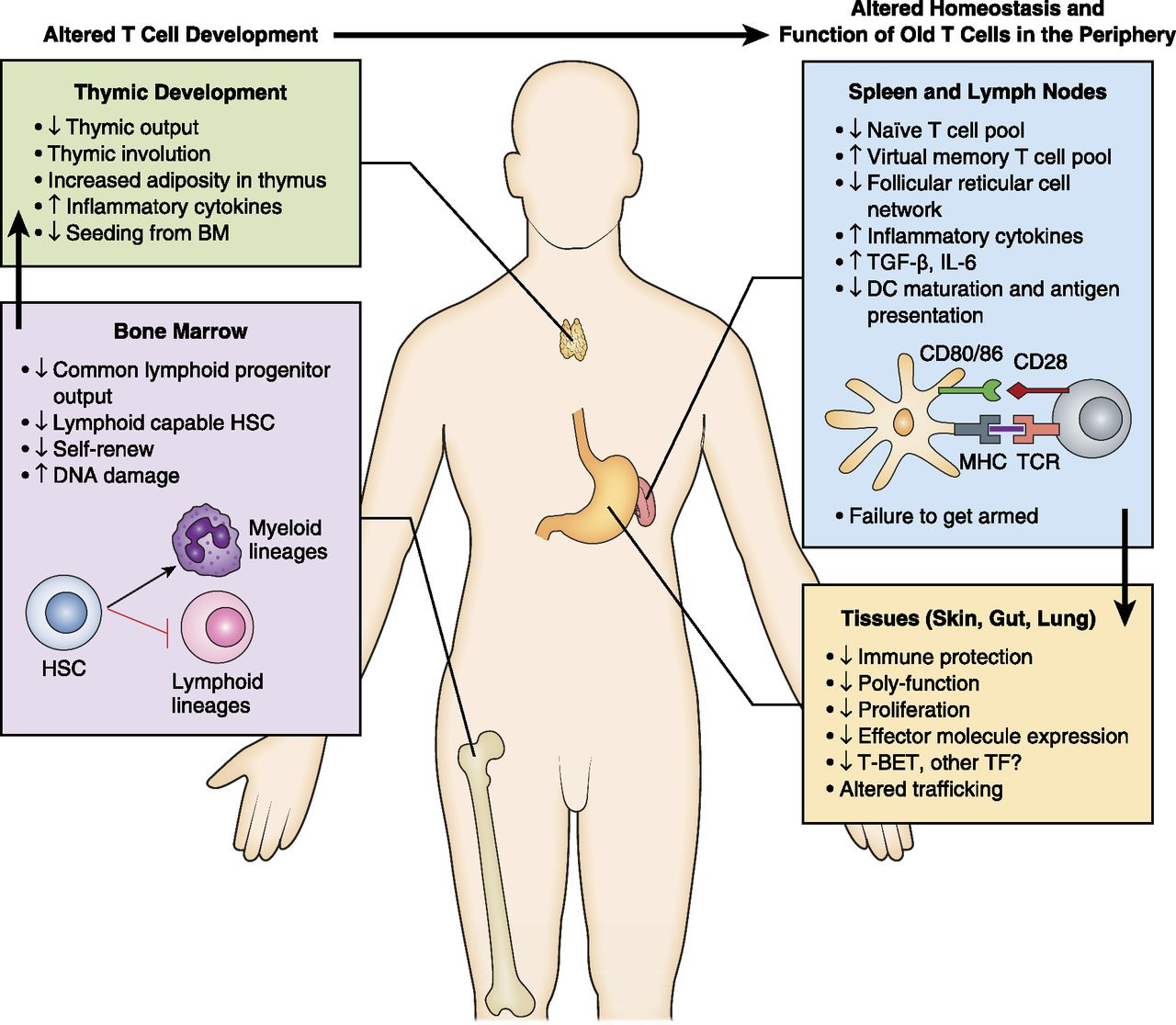These Two Factors May Reverse Aging Effects on our Immune System's Fight Against Viral Infections
Do you know why we get more sick as we age? And why COVID-19 is particularly dangerous to aged populations? Do you know what other factors besides age attenuate our immune response and T cells? What are T cells? And what simple tricks we can use to possibly reverse the age-dependent Immunosenescence? If you are curious, this blog is for you. The information provided is for educational purposes only, and does not substitute for professional medical advice. I also share much more in-depth updated information about the ways our brain and body communicate, flourish (health) or burn out (disease) together in my new book, currently highly ranked on Amazon’s Hot New Release.
How Does Our Immune System Work? In Simple terms:
The immune system, particularly that of humans, is one of the most complex biological systems in the universe. Anyone who studies even basic immunology realizes how intelligently our immune system is designed. And how despite all our progress in artificial immunization strategies and inoculation, we still do not quite understand what makes a foreign element in our body “immunogenic,” or triggering our immune system’s attack. Basically, we are submerged in a universe of invisible microbes, nanoparticles, radiations and forces (like electromagnetic fields). Our body reacts to each of these in a different way. Today, well-read and well-rounded scientists and doctors realize that many of our diseases like cancer, malaise like constipation, and disorders like depression and pains, are indeed rooted in our body’s dysregulated (immune) reaction to external stressors. Wise experts also recognize that each person’s immune system is unique, like their fingerprint, so it is not easy to design one-size-fits-all artificial immunization strategies.
There are also gender-dependent immunological factors. For example, we now know that sex hormones impact our immune response. Generally testosterone is immunosuppressive but estrogen is immunoenhancing. The immune system in women, perhaps as a result of being potential hosts of babies, generally does a better job both in identifying external pathogens (particularly viruses) and in managing the complement system and cytokine (stress signaling messenger molecules) storms afterwards which often lead to severity of the disease. But in aged women, reproductive function is not required so enhanced immune reactivity makes older females less vulnerable to viral infections and cancers but more prone to autoimmune diseases as well as adverse reactions to (injuries by) gender-blind vaccines.
We now understand that our immune system, once it decides to fight an external element as immunogenic, uses two strategies: Innate and/or adaptive, kind of like the opening game and the middle game in the game of chess. Like a masterful chess player, our immune system realizes time is limited and it only has a limited number of troops and assets. The equivalent of chess player’s end game in our immune system is the disease or inflammation stage, which engages almost all our resources. The difference between our body’s immune system and a chess Grandmaster is that our body is playing simultaneous chess games, non-stop, 24/7, against thousands and millions of opponents (pathogens or immunogens) with different strategies. Bacteria, for example, often have a different strategy than viruses, which have various strategies and pathogenesis (the strategy, path and mechanism for disease or disorder to spread).
Our innate immune system is the opening game against immunogens and pathogens (agents causing disease). Our various types of white blood cells (Leukocytes: Leuko means white in Latin, Cyte means cell) and other defensive cellular barriers and membranes in our skin, nose, lungs, mouth, etc., through a coordinate process, surround pathogens, send stress signals to other defenders and the rest of the body, try to destroy the pathogens, and then take some of the enemy’s fragment samples (antigens) to present (via Dendritic cells, for example) to our adaptive immune system, which is responsible for forming memories and adaptive strategies for each particular pathogen for future planning and resource optimization. Remember, when you are simultaneously playing thousands of chess boards, you need to remember each opponent’s strategies so you can defeat them easier the next time you face them.
T Cells, B Cells and Adaptive Immune System
The two main types of cells our adaptive immune system uses are B cells and T cells. B cells are produced mainly in our bone marrow (B is for Bone marrow). T cells are produced in our thymus (T is for Thymus). B cells are mostly in charge of patrolling blood circulation to:
Identify (and tag) enemy’s antigens circulating in our blood (humoral or serum)
Coagulate antigens in a process called Agglutination (sticking and clumping antigens together, like handcuffing and immobilizing them)
Memory B cells specialize in indexing the most dangerous enemy fragments (antigens) in blood circulation.
T cells are our specialized lymphocytes (immune cells) for detecting and attacking pathogens. They are of three main types:
Cytotoxic T cell (CD8+) recognizes our own infected cells, becomes activated and produces molecules that kill the infected cell, destroying the pathogen in the process.
Helper T cells (CD4+) are specialized to recognize pathogen fragments displayed by antigen presenting cells. Once they recognize (in memory) or get trained (for the first time as naive cells), helper T cells produce a situation-dependent specialized combination of cytokines (stress signaling messenger molecules).
Regulatory T cells balance other T cells and play a protective role by shutting off the immune response when proper balance is achieved. Remember, an immune response overkill is like nuking an invader to our town. We lose more than the enemy in that process.
What Happens with Aging and Chronic Stressors?
Our body has to optimize its limited resources over time as we age or are exposed to chronic stressors and frequent attacks by pathogens. We cannot be in a constant state of war without sacrificing our other metabolic functions and health. Peace activists may liken this to crumbling domestic economy and infrastructure due to war mongering. ..




